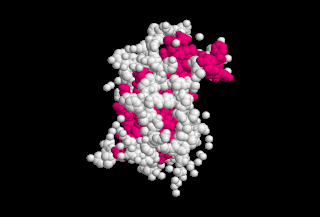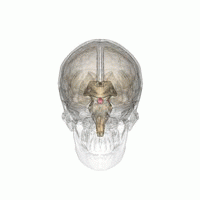
Cushing's syndrome is a collection of signs and symptoms due to prolonged exposure to glucocorticoids such as cortisol. Signs and symptoms may include high blood pressure, abdominal obesity but with thin arms and legs, reddish stretch marks, a round red face, a fat lump between the shoulders, weak muscles, weak bones, acne, and fragile skin that heals poorly. Women may have more hair and irregular menstruation. Occasionally there may be changes in mood, headaches, and a chronic feeling of tiredness.

Addison's disease, also known as primary adrenal insufficiency, is a rare long-term endocrine disorder characterized by inadequate production of the steroid hormones cortisol and aldosterone by the two outer layers of the cells of the adrenal glands, causing adrenal insufficiency. Symptoms generally come on slowly and insidiously and may include abdominal pain and gastrointestinal abnormalities, weakness, and weight loss. Darkening of the skin in certain areas may also occur. Under certain circumstances, an adrenal crisis may occur with low blood pressure, vomiting, lower back pain, and loss of consciousness. Mood changes may also occur. Rapid onset of symptoms indicates acute adrenal failure which is a serious and emergent condition. An adrenal crisis can be triggered by stress, such as from an injury, surgery, or infection.
Cushing's disease is one cause of Cushing's syndrome characterised by increased secretion of adrenocorticotropic hormone (ACTH) from the anterior pituitary. This is most often as a result of a pituitary adenoma or due to excess production of hypothalamus CRH that stimulates the synthesis of cortisol by the adrenal glands. Pituitary adenomas are responsible for 80% of endogenous Cushing's syndrome, when excluding Cushing's syndrome from exogenously administered corticosteroids. The equine version of this disease is Pituitary pars intermedia dysfunction.

Growth hormone deficiency (GHD), or human growth hormone deficiency, is a medical condition resulting from not enough growth hormone (GH). Generally the most noticeable symptom is that an individual attains a short height. Newborns may also present low blood sugar or a small penis size. In adults there may be decreased muscle mass, high cholesterol levels, or poor bone density.

Hypopituitarism is the decreased (hypo) secretion of one or more of the eight hormones normally produced by the pituitary gland at the base of the brain. If there is decreased secretion of one specific pituitary hormone, the condition is known as selective hypopituitarism. If there is decreased secretion of most or all pituitary hormones, the term panhypopituitarism is used.

Pituitary adenomas are tumors that occur in the pituitary gland. Pituitary adenomas are generally divided into three categories dependent upon their biological functioning: benign adenoma, invasive adenoma, and carcinomas. Most adenomas are benign, approximately 35% are invasive and just 0.1% to 0.2% are carcinomas. Pituitary adenomas represent from 10% to 25% of all intracranial neoplasms and the estimated prevalence rate in the general population is approximately 17%.

A prolactinoma is a benign tumor (adenoma) of the pituitary gland that produces a hormone called prolactin. It is the most common type of functioning pituitary tumor. Symptoms of prolactinoma are due to too much prolactin in the blood (hyperprolactinemia), or those caused by pressure of the tumor on surrounding tissues.

Multiple endocrine neoplasia type 1 (MEN-1) is one of a group of disorders, the multiple endocrine neoplasias, that affect the endocrine system through development of neoplastic lesions in pituitary, parathyroid gland and pancreas. It was first described by Paul Wermer in 1954.

A craniopharyngioma is a rare type of brain tumor derived from pituitary gland embryonic tissue that occurs most commonly in children, but also affects adults. It may present at any age, even in the prenatal and neonatal periods, but peak incidence rates are childhood-onset at 5–14 years and adult-onset at 50–74 years. People may present with bitemporal inferior quadrantanopia leading to bitemporal hemianopsia, as the tumor may compress the optic chiasm. It has a point prevalence around two per 1,000,000. Craniopharyngiomas are distinct from Rathke's cleft tumours and intrasellar arachnoid cysts.

Empty sella syndrome is the condition when the pituitary gland shrinks or becomes flattened, filling the sella turcica with cerebrospinal fluid instead of the normal pituitary. It can be discovered as part of the diagnostic workup of pituitary disorders, or as an incidental finding when imaging the brain.

Hyperpituitarism is a condition due to the primary hypersecretion of pituitary hormones; it typically results from a pituitary adenoma. In children with hyperpituitarism, disruption of growth regulation is rare, either because of hormone hypersecretion or because of manifestations caused by local compression of the adenoma.

Endocrine diseases are disorders of the endocrine system. The branch of medicine associated with endocrine disorders is known as endocrinology.

Arabian Gulf University is a university in the city of Manama, in the Kingdom of Bahrain. It is accredited by the Ministry of Education, Bahrain, and governed by Gulf Cooperative Countries, and is a member of Federation of the Universities of the Islamic World. Entry into the university is restricted to GCC nationals, with other Arab nationals considered only if vacancies are available.

Acromegaly is a disorder that results from excess growth hormone (GH) after the growth plates have closed. The initial symptom is typically enlargement of the hands and feet. There may also be an enlargement of the forehead, jaw, and nose. Other symptoms may include joint pain, thicker skin, deepening of the voice, headaches, and problems with vision. Complications of the disease may include type 2 diabetes, sleep apnea, and high blood pressure.
Second Opinion, an American television series, is the only regularly scheduled health series on public television. Each week, series host engages a panel of medical professionals and patients in honest, in-depth discussions about life-changing medical decisions. Using intriguing, real-life medical cases, the specialists grapple with diagnosis and treatment options to give viewers the most up-to-date, accurate medical information. The series is produced for public television by WXXI-TV, the University of Rochester Medical Center and West 175 Productions. Second Opinion is made possible with support from the Blue Cross and Blue Shield Association.
Central diabetes insipidus, also called neurogenic diabetes insipidus, is a type of diabetes insipidus due to a lack of vasopressin (ADH) production in the brain. Vasopressin acts to increase the volume of blood (intravascularly), and decrease the volume of urine produced. Therefore, a lack of it causes increased urine production and volume depletion.

The Royal College of Surgeons in Ireland - Bahrain formerly known as the Royal College of Surgeons in Ireland - Medical University of Bahrain is a constituent university of the Royal College of Surgeons in Ireland, which was established in 1784. Like its Dublin counterpart situated on St. Stephen's Green, RCSI Bahrain is a not-for-profit health sciences institution focused on education and research. The university incorporates schools of medicine, nursing, and postgraduate studies and research, and thus provides both undergraduate and postgraduate levels of education and research activities in a number of healthcare fields.
Galactorrhea hyperprolactinemia is increased blood prolactin levels associated with galactorrhea. It may be caused by such things as certain medications, pituitary disorders and thyroid disorders. The condition can occur in males as well as females. Relatively common etiologies include prolactinoma, medication effect, kidney failure, granulomatous diseases of the pituitary gland, and disorders which interfere with the hypothalamic inhibition of prolactin release. Ectopic (non-pituitary) production of prolactin may also occur. Galactorrhea hyperprolactinemia is listed as a “rare disease” by the Office of Rare Diseases of the National Institutes of Health. This means that it affects less than 200,000 people in the United States population.

Zvonko Kusić is a Croatian physician, professor of oncology and nuclear medicine, head of the Department of Oncology and Nuclear Medicine of the Sisters of Charity University Hospital in Zagreb and president of the Croatian Academy of Sciences and Arts (HAZU). He is a Fellow of the Croatian Academy of Sciences and Arts (FCA).
Endocrine & Metabolism Research Institute (EMRI) is one of Tehran University of Medical Sciences research institute and a pioneering institute with a mission to combine clinical care, research and education in diabetes, endocrine and metabolic diseases.















